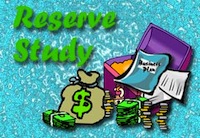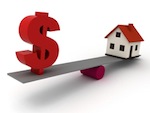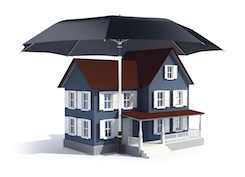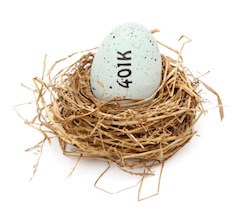Debt Collection: Know Your Rights!

If you’re on the receiving end of debt collection calls and letters, you may feel alone and unprotected. But the Fair Debt Collection Practices Act (FDCPA), enforced by the Federal Trade Commission (FTC), provides you with certain rights from debt collectors, including lawyers and in-house and third-party collection agencies.
Here’s a brief look at what is, and isn’t, allowed under the FDCPA...
Read More About: Debt Collection: Understand Your Rights!
Why Have A Professional Reserve Study?

As a business, the Board needs a business plan for the maintenance of the assets of the association. Which assets or parts thereof (i.e. partial pavement replacements, phasing roofing replacements) will require repair or replacement, when will they need replacement, and at what cost are the most important questions one must ask in determining a forecast of future capital projects.
When managing the contributions (assessments) of hundreds of homeowners, it is essential to provide as accurate a forecast as possible. Professional Reserve Study providers have the extra expertise from conducting hundreds of assignments each year to apply engineering success stories from other associations and determine the most reasonable reserve budget that is consistent with Board objectives.
Read More About: Why Have A Professional Reserve Study?
How To Raise Your HOA Dues...

It is the responsibility of your homeowners association’s board to set a budget each year, which includes the monthly income from homeowners, or association dues. While raising dues is never popular, it is a necessary step to properly maintain your community—and maintain the property values of those who are part of it.
Proper planning and open communication can help ease the pain of increasing monthly homeowners association dues. So how do you raise your HOA’s dues without receiving backlash from homeowners? Follow these five steps...
Read More About: How To Increase Your HOA Dues...
What Happens If You Don't Pay Your HOA Dues?

Your homeowners association has bills to pay: heat, electricity, landscaping, maintenance, repairs, employees and possibly more depending on your community’s unique features. As a homeowner, you pay a portion of those fees—your HOA dues—each month.
When you fall behind on your payments, it becomes harder for the HOA to maintain the community, and other homeowners usually end up paying more to cover your missed payments. To help recover these funds, HOAs can take a number of different avenues, depending on the association’s governing documents and state and federal laws.
Read More About: What Happens If You Don't Pay Your HOA Dues...
Protect Your Child From Identity Theft

You’re aware of the dangers of identity theft—and the hassle of trying to clear your name and credit should you ever become a victim. So you’ve taken steps to protect yourself.
But what about your children? Identity theft among teens and children is growing faster than any other age group. They have clean credit records and crimes against their identity often aren’t discovered for years, making them attractive targets to thieves.
In this month's article, you will learn how to keep your child’s identity safe!
Read More About: How To Protect Your Child From Identity Theft
Fire Safety In Your Community

Fires can start anywhere at any time. Help keep your homeowners and community safe with regular fire education and preventive actions.
Whether you live in a neighborhood, gated community or a condo building, there are important things you can do to help keep your community—and those who live in it—safe from fire.
Read More About: Fire Safety In Your Community
Financial Records: What To Save And What To Shred

We all tend to have a love/hate relationship with our financial documents. We love to keep them…but hate the clutter.
The good news is that you can likely get rid of many of those documents you’ve lovingly saved over the years. Here’s an overview of what you should save and for how long.
Read More About: Financial Records: What To Save And What To Shred
Managing Your Aging Parents' Finances

Are your elderly parents having trouble staying organized? Do they forget common things like important dates, or ask for the same information over and over?
Are there reminder notes or memory aides scattered around their home? If so, your parents could be struggling with memory loss.
Among the many difficulties you and your parents will have to face in such a situation is managing their finances...
Read More About: Managing Your Aging Parents' Finances...
Get Rid of Old Debt: Know Your Rights!

By law, debt collectors cannot sue you to repay what is called "a time-barred debt". If you have old debt, there’s good news and there’s bad news. Bad news first: you still owe the money.
Now for the good news: you may be safe from a lawsuit to repay the debt. After a period of time, called the statute of limitations, your debt is considered time-barred, and under the Fair Debt Collection Practices Act (FDCPA), you cannot be subjected to any legal action to repay that debt.
Know your rights under the FDCPA by following these guidelines:
Read More About: Get Rid Of Old Debt: Know Your Rights!
Homeowners Insurance: What Not To Do!

Before you make that next purchase or home upgrade, be sure to check how much extra you’ll need to pay for your homeowners insurance rates.
The cost of your homeowners insurance rate varies on a number of factors—from the size of your home to its location to what you put in and outside of it. That trampoline that provides your kids with hours or entertainment? It could also be costing you extra on your home insurance premium.
Read More About: Homeowners Insurance: What Not To Do!
Qualify Your HOA For FHA Loans...

Ensuring that your condo or townhome association is on the FHA approved list is important to everyone.
It’s important to potential buyers who may not otherwise qualify to purchase a home in your association. It’s important to current owners who may want to sell one day and want a larger pool of buyers for their unit. And it’s important to the association itself, as that larger pool of buyers helps create more competition, which raises unit prices.
In the past, whether or not an association qualified for FHA loans wasn’t so important, as lenders could do “spot loans” for specific units. New laws changed that, however. So that FHA-approved pool of buyers can now only purchase in FHA-approved associations.
Read More About: How To Qualify Your HOA For FHA Loans...
Holiday Decorations And HOAs...

Americans love to show their holiday spirit. From flying flags on Independence Day to spooky set-ups for Halloween to twinkling trees for the winter holidays, we put a great deal of time, effort and love into our displays. But when you live in a homeowners association community, your delightful decorations may be a nuisance to your neighbor.
Bright and noisy displays can quickly wear out their welcome and religious decorations could offend others. But you can still keep your holiday spirit while maintaining your community’s standards.
Read More About: Holiday Decorations And HOAs
Why You Need A Will!

You know the saying about the two things we can’t escape, so why not protect your wishes and your heirs when that fateful day arrives? (No, not April 15.) Everyone will die at some point, which means that everyone needs to have a will. Wills give you a voice after your death—and sometimes before—to help protect your wishes and those you care about.
Read More About: Why You Need a Will!
Should You Pay Off Your Mortgage?

While a home loan is far and away that largest percentage of a person’s debt load, does it make sense to pay it off completely?
In hard economic times, we’re all looking for ways to reduce our debt. But should you pay off your home loan? Everyone’s situation is unique—find out if paying off your mortgage makes sense for you.
Read More About: Should You Pay Off Your Mortgage?
Reverse Mortgage Pros & Cons...

Seniors are feeling just as cash-strapped as the rest of Americans right now. Many have lost a good portion of their retirement fund, some have lost their jobs, and others are feeling the pinch of rising health-care costs. The idea of tapping into your home equity through a reverse mortgage can sound appealing, but it isn’t right for everyone.
Reverse mortgages can provide seniors with some new financial options, but there are drawbacks. Learn what you should take into consideration before taking out a reverse mortgage.
Read More About: Reverse Mortgages: Pros and Cons
How To Challenge Your Property Assessment!

If your home value is dropping but your property taxes are not, you can appeal the assessed value of your home which may help lower your taxes.
Property values are down, so why doesn’t your property tax assessment reflect that? It’s estimated that between 30 and 60 percent of all taxable property in the country is over-assessed.
If you think your property tax assessment is off by 10 percent or more, you should consider challenging it. It will take some time, but is something you can do on your own.This resource guide article will show you how to go about it.
Read More About: How To Challenge Your Property Assessment
How Much Do I Need To Save For Retirement?

When beginning to plan for retirement, often the first question people ask is: How much do I need to save?
Before this can really be answered, you’ll need to do some thoughtful planning about the type of retirement you are envisioning; but, in general, you should expect to have saved enough to generate retirement income of anywhere from 70 percent to 120 percent of your current income.
Before your eyes pop out of their sockets, it’s important to keep in mind that how much you need for your retirement savings really depends on your situation.
This resource guide article will provide you some tools and tips for calculating your retirement savings number.
Read More About: How Much Do I Need To Save For Retirement?
Managing Your Money With Kids...

Some say having a child is priceless. Others say it costs up to $250,000 (to raise them from birth through age 17). In any event, having children is definitely a game-changer when it comes to managing your family’s finances.
What worked when it was just the two of you will have to be scrutinized or even scratched. Planning and managing your family’s finances now that junior has arrived will take some time—but is more important than ever.
Here are seven steps all young families should take to secure their finances..
Read More About: 7 Steps To Managing Your Money If You Have Kids...
Catch Up On Retirement Savings...

Investments are down. Home equity has shrunk. Paychecks have diminished—if you’re lucky enough to still have one.
You may have experienced any or all of these situations over the past few years. But there are ways to get your retirement savings back on track—no matter what your age.
With April 15th fast approaching, now is the time to take advantage of some of the tips mentioned in this article.
Read More About: How To Catch Up On Your Retirement Savings...
How To Save On Health Care Costs...

With unemployment high and overall wealth down, it can be tempting to cut your health insurance in an effort to save money. Don’t.
According to a recent study from Harvard University, 62 percent of all personal bankruptcies are due to medical expenses. The good news is that there are a number of steps you can take to make your health insurance more affordable.
Read More About: How To Save On Your Health-Care Costs...
Year End Tax Tips for 2010

There are a number of steps you can take each year to reduce your taxes. This year, several new tax breaks were introduced to help individuals, families and business owners struggling in the ailing economy. Here are a few you may be eligible to take advantage of when doing your taxes in 2011.
No limit on itemized deductions.
While this may change next year for the $100,000-and-over tax bracket, for 2010 there is no limit on any itemized deductions. Before December 31, pay any charitable contributions, local or state taxes, health-care costs, or anything else you can itemize on your taxes.
Credit those college expenses.
The American opportunity tax credit (which expanded and re-named the Hope credit) can be claimed for tuition and other fees paid by students or their parents. (The credit is phased out at higher income levels.) The maximum amount you can claim has been raised to $2,500 for 2010—a $700 increase. The number of years you can claim this credit has also increased from two years to four post-secondary education years.
Read More About: 2010 Year End Tax Tips
Also: Year End Tax Tips To Save You Money....
Buying A Gift Card? What You Need To Know

For those hard-to-shop-for people on your list, a gift card can seem like the perfect option—it fits any style and, according to the National Retail Federation, is the gift most requested.
While new laws implemented on August 22, 2010, by the Credit CARD Act regulate fees, expiration dates and other issues related to gift cards, you’ll still need to do a little homework to ensure the card you’re purchasing is the best value. Here’s what you need to know.
Read More About: The Ins and Outs of Buying a Gift Card.........
November Resource Guide

Last month's articles contain great information on subjects such as: Protecting Your Home From the Foreclosure Next Door, Winterizing Your Home, Long Term Care Insurance, Affordable Solar Options,Year End Tax Tips, and much more....
Below is an index with links to the newest articles in the Neighborhood Link Resource Guide from November 2010.
- Protect Your Home's Value From The Foreclosure Next Door
- Do You Need Gap Car Insurance?
- 8 Ways To Winterize Your Home
- Affordable Solar Options
- Do You Need Long Term Care Insurance?
- Year End Tax Tips To Save You Money
- 2010 Year End Tax Tips
- Pick The Meicare Part D Plan That's Right For You!
- Do You Need Medicare Part D Insurance?
- Should You Buy A Tankless Water Heater?
Protect Your Home From The Foreclosure Next Door

And having a foreclosed home or two (or more) in your neighborhood isn’t just potentially bad for curb appeal. It can also invite crime, which could cause your homeowners insurance to increase.
But there are things you and your neighbors can do to help maintain the value of your home—and your neighborhood.
Read More About: How To Protect Your Home's Value From The Foreclosure Next Door...
How To Save On Closing Costs

Closing costs seem to be a necessary evil when securing a new, or refinancing a current, mortgage. And they can be expensive—anywhere from 3 percent to 6 percent of the price of your home. But there is a silver lining: you can reduce your closing costs with a little knowledge and a few negotiating tactics.
Read More About: How To Save On Closing Costs
October Resource Guide

The articles contain great information on subjects such as: Homeowners Insurance, Real Estate, Health Insurance, How to Start a Neighborhood Watch, Choosing A School for Your Child, FHA Loan Requirements, How To Save For Retirement, and much more....
Below is an index with links to the newest articles in the Neighborhood Link Resource Guide from October 2010.
- How To Buy A Short Sale Property
- Help Your Kids Stay Safe Online
- Should An Annuity Be Part Of Your Retirement
- Should You Invest In An ETF
- Catch Up On Your Retirement Savings
- How To Save On Closing Costs
- 5 Ways To Save On Car Insurance
- Do You Need Term Life Insurance?
- Ditch Your Cable Bill For These Cheaper Alternatives
- How To Survive Holiday Travel
6 Steps To Create And Manage a Budget

Finances are always a top concern for anyone with bills to pay. Yet most of us can probably rattle off half of the Ben & Jerry ice cream flavors before we can give an accurate account of our financial situations.
A budget can help with this. Creating and maintaining a budget can seem overwhelming or restrictive at first. But developing a budget is your best bet for understanding your finances and reaching your goals. And with the variety of tools available these days, you can get your budget started in the time it would take you to eat that pint of Cherry Garcia.
Step 1: Set your financial goals.
Do you want to buy a house? Go back to school? Get out of debt? Whatever your goals may be, put them in writing and then display them where they’re easily visible to you. Seeing your goals every day can be a great motivational tool.
Read More About: 6 Steps To Create And Manage A Budget
Related Articles:
How To Save for College With A 529 Plan

The cost for higher education continues to grow. On average, students pay $7,020 per year in tuition and fees for public in-state colleges ($11,528 for out-of-state). And if your child is attending a private four-year college? Expect to pay $26,273 per year. And these costs will continue to rise.
Between 2000 and 2010, tuition increased at an average annual rate of 4.9 percent beyond general inflation—more rapidly than in either of the previous two decades.
Luckily, a number of options exist for you and your child to save and pay for college. One savings vehicle that continues to grow in popularity is the 529 plan. Created in 1996 and named after Section 529 of the Internal Revenue Code, a 529 plan is an education savings tool operated by a state or educational institution.
Read More About: Saving For College with a 529 Plan
Related Articles:
Why You Need a Personal Health Record

Storing and tracking your medical records online can help save you time, money and possible health complications by taking an active role in monitoring your health.
Pop quiz: Name the medications prescribed to you, the findings of your last medical exam, your cholesterol level, and the date you received your rubella immunization shot. If you had a personal health record, you’d quickly know the answers to these. A personal health record, also known as a PHR, is a tool that can help you track, monitor and share your health information.
Read More About: Why You Need a Personal Health Record...
Related Articles:
- Medicare Supplement Changes for 2010
- Affordable health insurance: How to save on your health-care costs
- Purchasing Individual Health Insurance: What you need to know
- Prescription Insurance
- HMO Insurance
- Why You Need Long Term Disability Insurance
- Medicare Prescription Drug Coverage
- Medigap Supplemental Insurance Explained
- Supplemental Insurance - What Is It?
- Medical Marijuana - Should Marijuana Be a Medical Option?
- Prescription Drugs - Should They Be Advertised to Consumers?
Staging Your Home For Sale: Room by Room

Learn how to stage each room of your home to show off its best features and create an environment where buyers can see themselves at home.
Staging your home for sale is especially important in a buyer’s market. With housing inventory high and prices falling, potential buyers have many more options available to them. And their demands are high. If you want to get your asking price (or sometimes higher), you’ll need to spend some time staging your home.
There are some basic home staging items you’ll need to do. Once those are complete, there is more you can do to help your home sell faster and for more. Here’s a room by room guide to stage your home for sale.
Read More About: Staging Your Home For Sale: Room by Room
Related Information:
FHA Loan Requirements Are Changing

FHA reform is changing the rules for securing an FHA-insured mortgage loan, but FHA loans still provide the best opportunity for those who don’t meet the requirements of a traditional home loan.
By now we're all pretty used to reform. We've seen health care reform, credit card reform, financial reform—all within the past year or so.
So it should come with little surprise that mortgage loans insured by the Federal Housing Administration (FHA) are now facing reform as well. Early this summer, the House of Representatives passed the FHA Reform Act, which is also expected to pass the Senate. The reform comes as a result of the high number of mortgage defaults seen in the past few years, which has reduced the reserves of the FHA below legal limits. To rectify this, several changes are in the works.
What is an FHA-insured mortgage loan?
The FHA does not make home loans. The administration simply insures mortgage lenders against the possibility of default on a loan. The FHA program is mainly targeted towards first-time home buyers who might not otherwise qualify for a traditional home loan because of the high down payment and credit score requirements. (Whenever a borrower has less than a 20 percent down payment, lenders require mortgage insurance.) Currently the FHA insures nearly one-third of all new mortgages—up from just four percent in 2006.
Read More About: FHA Loan Requirements Are Changing
Related Articles:
- Should You Refinance Your Mortgage?
- What are the FHA Loan Requirements?
- Do You Qualify for an FHA Loan?
- For Sale By Owner: How to Sell Your Own Home
- FHA Refinance:Loan Options and Guidelines
- Selling Your Home? Try These Creative Strategies
- What is a 203K FHA Loan?
- First Time Homebuyers Guide
- Financial Assistance for First Time Homebuyers
- Tips on Buying a Home
- How to Sell Your Home In a Down Market
Creative Strategies for Selling Your Home

Gone are the days when all it took to sell a house was a “for sale” sign in the front yard. Here are five creative strategies to help your home go from “for sale” to “sold.”
We all know the housing market is tough these days. Foreclosures are up, home values are down. So how do you make your house stand out in the crowd and sell quickly?
Whether you have a real estate broker or are selling your home on your own, these creative selling strategies could help you make that sale.
Reinvent the open house
We’re all familiar with the traditional open house and, if you’ve been to a few, they all tend to blur together. To make your open house stand out, try throwing a lively party that offers wine, catered hors d’oeuvres, live music and prizes. Use the opportunity to show your home full of life, the way it will be for those who will eventually be living in it.
Throwing an open house party also enables you to show off the best features of your home. Have a quartet playing in your living room that showcases your fabulous view. Hire a chef to prepare hors d’oeuvres in your gourmet kitchen. Throw a BBQ out on your large deck.
As with any open house, just be sure you aren’t there when it happens. And if you are doing for sale by owner, you can still throw a party. Invite everyone you know and ask them to bring a friend to spread the word. Have a trusted friend or family member serve as host to the party.
Read All the Details On: Creative Strategies for Selling Your Home
Related Articles:
- For Sale By Owner: How to Sell Your Own Home
- Should you refinance your home mortgage?
- FHA Loan Requirements Are Changing
- How to Sell Your Home In a Down Market
- Co-Signing A Loan: What You Need to Know!
- Avoid Foreclosure Rescue Scams
- Loan Modification: Is it Right for You?
- What Is Foreclosure?
- What Is A Short Sale?
- What Is A Deed-In-Lieu?
- How To Avoid Foreclosure
- Do You Qualify for an FHA Loan?
For Sale By Owner: How To Sell Your Own Home

Selling your home on your own can save you thousands of dollars in commissions, but you have to be willing to put in the extra effort. Learn how to go through the “for sale by owner” process—it’s not as hard as you may think.
You already know that skipping the real estate agent and selling your home yourself can potentially save you thousands of dollars in commissions. But you may be wondering if this option is right for you, or where to begin.
“For sale by owner,” or “FSBO” (pronounced fizz-bo), is actually easier than most people think, as long as you’re willing to put in the extra effort and time to save some cash.
Prepare your home for sale
Whether you’re selling your home on your own or listing it with a realtor, this is one step you can’t avoid. Take a look around your home for repairs that you’ve long since stopped noticing. Finish any unfinished projects. Banish all odors from your home, clean it from top to bottom, and declutter and streamline your belongings.
Read More and Learn All Steps in: How to Sell Your Own Home
Related Articles:
- FHA Loan Requirements Are Changing
- Selling Your Home? Try These Creative Strategies
- How to Sell Your Home In a Down Market
- Should you refinance your home mortgage?
- Co-Signing A Loan: What You Need to Know!
- Avoid Foreclosure Rescue Scams
- Loan Modification: Is it Right for You?
- What Is Foreclosure?
- What Is A Short Sale?
- What Is A Deed-In-Lieu?
- How To Avoid Foreclosure
- Do You Qualify for an FHA Loan?
Travel Apps for Your Next Vacation

The final article is our summer vacation series. Travel applications for your smartphone can help you get the most out of your next vacation or trip.
We can't live without our cell phones and now, whether you travel a little or a lot, there's a travel application for your smartphone that you'll find you can't live without either.
Need to book a hotel room on the road? There's an app for that. Wondering what the current exchange rate is for the Yen? There's an app for that, too. Trying to find a taxi? You're covered. And many of the travel apps out there can help make your vacation more affordable by finding the best deals and providing cost information upfront.
Here are some of the best travel apps out there to help you pack, organize, travel, stay, learn, eat, track and share your next trip. And since not all travel apps are created equal, prices and phone platforms are noted (as of June 2010).
Planes, trains and automobiles
Need to book a flight, find local transportation or view a train route? These travel apps can help.
Kayak.
Search for flights, rental cars and hotels and get information on your flight status, price and trends. Cost: Free. Available for: BlackBerry, iPhone, Android platforms.
Gate Maps.
Need to find out where gate C4 is at O’Hare? This app offers maps of major airports in the U.S. along with a few from other countries. Great for when you have just a few minutes to catch your connection. Cost: 99 cents. Available for: iPhone.
Airline Seat Guide.
See seating guides for aircraft from most major airlines to select the best seat on a flight. Seats are rated by color: green is good, yellow is average and red you’ll want to avoid. Cost: $1.99. Available for: iPhone.
Transport Maps.
Provides worldwide maps of public transit systems. Whether you need a bus, train or light rail to get where you’re going, you can download the map you need to save to your phone. This travel app lacks route planning, however. Cost: Free.
Available for: Android.
Google Maps.
Shows where you are and how to get where you’re going by driving, walking or public transit. Cost: Free. Available for: Any smartphone platform.
Taxi Magic.
Pull up a list of available cab companies in your area and, in some instances, make a reservation through your phone. Cost: Free. Available for: BlackBerry, iPhone, Android.
Read More About: Travel Apps for Your Next Vacation
Related Articles:
- Affordable vacations: How to travel on the cheap
- How to buy and rent a vacation home
- How to sell your vacation timeshare
- Airline Rewards Credit Cards - Get the Best Mileage for Your Money
- What Is The Passport Card?
- 5 Tips For Improving Your Credit Score
- How to Improve Your Credit Score
- What is a Credit Score?
How to Buy and Rent a Vacation Home

In keeping with our summer vacation theme, buying a vacation home for rental and personal use can offer a number of advantages, but is it right for you? Learn what you should consider before purchasing, the tax implications of owning a vacation rental home and how to rent it to offset expenses.
With interest rates still historically low, you may be tempted to purchase a second home to use as a vacation rental home (and for your own personal use as well). There is a market for renting out your vacation home, especially as travelers look for more affordable options closer to home.
Is owning a vacation rental home right for you?
Before purchasing a vacation property, it’s important to research any local laws or property restrictions that could affect your ability to rent your home. In addition, you need to take into consideration the location of your vacation rental home. Is it near a popular tourist attraction or destination, such as a beach? This will affect that marketability of your vacation home. You also need to be sure you are willing and able to:
- Do the necessary research to estimate how many weeks your vacation property will likely be rented, your monthly costs and your income potential.
- Give up the use of your vacation home during the peak season, when demand for your residence is the greatest.
- Put in the necessary work to advertise, screen tenants, and hire cleaning and maintenance crews.
- Maintain your second mortgage if times get tough in either the real estate or vacation markets.
Read More and Learn: How to Buy and Rent a Vacation Home
Related Articles:
- Affordable vacations: How to travel on the cheap
- How to sell your vacation timeshare
- Have phone, will travel: Travel apps for your next vacation
- Airline Rewards Credit Cards - Get the Best Mileage for Your Money
- What Is The Passport Card?
- 5 Tips For Improving Your Credit Score
- How to Improve Your Credit Score
- What is a Credit Score?
Affordable Vacations: How to Travel Cheap

Since it is June, that means its summer and time to think about vacations! Here are some tips for how to save on everything from transportation to hotels to airfare.
Tired of the “staycation?” Travel can be affordable, even for families. Here are some tips on how to create an affordable vacation.
Save on airfare
Airfare is one of your biggest travel expenses. But there are ways to find cheap airfare:
- Be flexible with your dates. If you are able to be flexible with your travel dates, you can find some great deals. Traveling during the off-season can save you even more.
- Be flexible with your destination. If you’re just looking to go somewhere, but don’t really care where, you can take advantage of advertised deals to determine your destination.
- Shop around. Check several different websites, such as Expedia, Travelocity, SideStep and Kayak. Once you find a deal, check out that airline’s website. Often, you can find the same deal without the extra booking charges. It’s a good idea to check out the airlines’ websites anyway as not all airlines participate in the discount sites.
- Sign up for airfare alerts. Many airlines and discount sites will alert you when a discount pops up. Simply sign up and indicate which cities you’re interested in.
- Book a travel package. Check out air and hotel packages. Buying together can be less expensive than purchasing separately.
- Travel light. It’s almost impossible these days to get around paying for your luggage, but the less you take the less you pay. Try to keep it to one bag per person.
Read More to Learn How To Save On Hotels, Food and Transportation: Affordable Vacations: How to Travel on the Cheap
Related Articles:
- Have phone, will travel: Travel apps for your next vacation
- How to buy and rent a vacation home
- How to sell your vacation timeshare
- Airline Rewards Credit Cards - Get the Best Mileage for Your Money
- What Is The Passport Card?
- 5 Tips For Improving Your Credit Score
- How to Improve Your Credit Score
- What is a Credit Score?
Home Maintenance Checklist

Keep this home maintenance checklist handy to maintain your home’s value and to provide a comfortable and safe living environment for yourself and your family.
Just as you need regular maintenance—in the form of healthy eating, exercise and regular check-ups—to remain in good health, so does your home.
Regular home maintenance could help prevent time-consuming and expensive projects down the road. Protect your largest financial investment by setting aside one weekend a month to check off some of these items. For an even more complete checklist of routine home maintenance, hire a professional inspector to visit your home and talk with you about areas you should regularly check.
Read More to Keep Your Home in Good Health with: The Complete Home Maintenance Checklist
Related Articles:
The Value of Home Maintenance

Regular maintenance of your home is an important part of maintaining its value. With proper maintenance your home will not only provide a pleasant and safe living environment but will also help keep small fixes from turning into expensive problems.
Your home is likely the largest financial investment you’ll ever make. Protect that investment by regularly performing routine home maintenance.
Regular maintenance helps prevent small issues from turning into major problems and helps maintain the value of your home. Don’t know where to begin? Follow these steps to realize the value of home maintenance.
Set aside a home maintenance fund
That old saying “it takes money to make money” holds true with your home’s value as well. According to the U.S. Census, annual home maintenance costs average more than $3,000 over time.
To be prepared for larger expenses down the road, or even for those weekend to-do list projects, plan to set aside 1 percent to 3 percent of your home’s initial purchase price for ongoing upkeep and repairs.
Read More About: The Value of Home Maintenance
Related Articles:
- Home Maintenance Checklist
- How To Choose A Contractor
- Homeowners insurance: What you need to know
- Homeowners Insurance Guide
- Homeowners Insurance: 12 Ways To Save!
- How to Buy a HUD Home
- How to Sell Your Home In a Down Market
- Do You Qualify for an FHA Loan?
Homeowners Insurance: What You Need to Know

How much homeowners insurance coverage do you need? What type of policy should you consider buying? Learn more about homeowners insurance and what you need to know to best insure your home, your possessions and your finances.
If you own a home, you need to have homeowner’s insurance. But how much, what type of coverage and whether you need extra coverage depends on your home, your possessions, your assets, and your location. Here’s what you need to know about homeowners insurance before you sign on for that policy.
How much homeowners insurance coverage do you need?
You will need enough to cover the structure of your home should you need to rebuild, to replace your personal possessions, to pay for living expenses if you need to live elsewhere while your home is repaired, and to pay for any damages brought against you by someone injured on your property.
Read More About: Homeowners Insurance: What You Need to Know
Related Articles:
- Homeowners Insurance Guide
- The value of home maintenance
- Home Maintenance Checklist
- Homeowners Insurance: 12 Ways To Save!
- How to Buy a HUD Home
- How to Sell Your Home In a Down Market
- Do You Qualify for an FHA Loan?
Reverse Mortgage: The Pros and Cons

Reverse mortgages can offer extra cash for seniors, but there are drawbacks. Learn what you should take into consideration before taking out a reverse mortgage.
Seniors are feeling just as cash-strapped as the rest of Americans right now. Many have lost a good portion of their retirement fund in the stock market collapse, some have lost their jobs, and others are feeling the pinch of rising health-care costs.
The idea of tapping into your home equity through a reverse mortgage can sound appealing, but it isn't right for everyone.
Read More About: The Pros and Cons of Reverse Mortgages
Related Articles:
- What Is A Reverse Mortgage?
- Features of a Reverse Mortgage
- Should you refinance your home mortgage?
- Loan Modification: Is it Right for You?
- Avoiding Foreclosure Rescue Scams
- What Is A Short Sale?
- What Is A Deed-In-Lieu?
- How To Avoid Foreclosure
- $8,000 Tax Credit for First Time Homebuyers
- First Time Homebuyers Guide
- Financial Assistance for First Time Homebuyers
Should you refinance your home mortgage?

Learn about the mortgage refinance process, if you qualify to refinance your home loan, and whether or not refinancing might benefit you.
The recession may be over, but most Americans wouldn’t know it. Unemployment and foreclosures remain high while the general outlook on the economy is low. Many are looking to refinance their home loan as a way to free up some dollars and possibly stay in their homes. While refinancing your home mortgage is always better than foreclosure, you should take the time to determine if refinancing is right for you.
The mortgage refinance process
When you refinance your home mortgage, you are simply restructuring your debt—not eliminating it. Your new refinanced loan pays off your original home loan. You now begin to make payments towards your refinanced mortgage, which typically has some type of advantage over your previous loan—whether it be a lower interest rate, longer repayment period, or a switch from an adjustable rate mortgage to a fixed rate mortgage.
While these are all great reasons to move forward with a mortgage refinance, there are costs to consider. Expect to pay around 2 percent to 3 percent of the total loan amount in refinance-related costs, including appraisal and closing costs. You may be able to negotiate away some of these costs if you stick with your current lender, but it’s worth shopping around to determine where you can get the best deal. (If you do fill out multiple applications for refinancing, be sure to do so within a 30-day period; your credit score won’t be dinged if you submit your applications during this time period.) Costs can be paid upfront if you have the cash, through a higher interest rate on your loan, or by rolling the fees into the principal of your mortgage.
Find Out Who Qualifies and If: You Should Refinance Your Mortgage?
Related Articles:
- FHA Loan Requirements Are Changing
- FHA Refinance:Loan Options and Guidelines
- What are the FHA Loan Requirements?
- For Sale By Owner: How to Sell Your Own Home
- Selling Your Home? Try These Creative Strategies
- What is a 203K FHA Loan?
- Funds for Handyman-Specials and Fixer-Uppers
- Do You Qualify for an FHA Loan?
- $8,000 Tax Credit for First Time Homebuyers
- First Time Homebuyers Guide
- Financial Assistance for First Time Homebuyers
- How to Improve Your Credit Score
- 5 Tips For Improving Your Credit Score
- How to Avoid Foreclosure
- What Is Foreclosure?
- What Is A Short Sale?
- What Is A Deed-In-Lieu?
- How to Buy a HUD Home
- Tips on Buying a Home
- How to Sell Your Home In a Down Market
How to save on your health-care costs

Health-care costs continue to rise, but there are things you can do to help make your health insurance more affordable.
With unemployment high and overall wealth down, it can be tempting to cut your health insurance in an effort to save money. Don’t. According to a recent study from Harvard University, 62 percent of all personal bankruptcies are due to medical expenses.
The good news is that there are a number of steps you can take to make your health insurance more affordable.
Shop around
Even if you have group health insurance through your employer, you may find an individual health insurance plan to be less expensive. Group plans provide a broad range of coverage because they are covering a diverse set of consumers. With an individual health insurance plan, you have more flexibility in selecting a plan that best fits your health-care needs.
Read More About: How to Save on Your Health-Care Costs
Related Articles:
- Purchasing Individual Health Insurance: What you need to know
- Prescription Insurance
- HMO Insurance
- Why You Need Long Term Disability Insurance
- Medicare Prescription Drug Coverage
- Medigap Supplemental Insurance Explained
- Supplemental Insurance - What Is It?
- Medical Marijuana - Should Marijuana Be a Medical Option?
- Prescription Drugs - Should They Be Advertised to Consumers?
Purchasing Individual Health Insurance: What To Know

Approximately 20 million Americans will be purchasing individual health insurance in 2010 thanks to lost jobs and benefit cuts. Learn more to find a plan that fits your health-care needs.
You can find individual insurance plans through a broker, one of the many online sites, or by going directly to an insurer. In all cases, you’ll need to do some research to ensure you select the best health-care coverage for you. Provisions of the health-care reform will help make this process easier in the future, but for now it’s up to you to carefully review your options.
It’s a good idea to have a basic understanding of health insurance before you begin comparing different individual insurance plans. Sites such as healthinsuranceinfo.net and healthcarecoach.com can provide you with a good knowledge base.
Individual health insurance plan options
Essentially there are three types of plan options for you to choose from: fee-for-service, HMOs, and PPOs.
- With fee-for-service plans, the insurer will pay for part or all of your care according to the policy you purchase. You get to choose your doctor and medical facility. Fee-for-service plans are typically the most expensive option.
- Health maintenance organizations (HMOs) require you to pay for your health care in advance through a monthly fee. Deductibles and copays are usually less expensive, but you must use a provider and clinic within the plan.
- With prefered provider organiztions (PPOs), you pay a deductible and copay (or coinsurance), but only when health care is received. You can utilize a network of providers and clinics for a discounted, negotiated rate. You can still see a doctor outside of your network, but it will cost more.
Read More About: What You Need to Know About Purchasing Individual Health Insurance
Related Articles:
- Affordable health insurance: How to save on your health-care costs
- HMO Insurance
- Why You Need Long Term Disability Insurance
- Prescription Insurance
- Medicare Prescription Drug Coverage
- Medigap Supplemental Insurance Explained
- Supplemental Insurance - What Is It?
- Medical Marijuana - Should Marijuana Be a Medical Option?
- Prescription Drugs - Should They Be Advertised to Consumers?
What Is a Health Insurance Exchange?

As part of the recent health-care reform bill, health insurance exchanges will become available in 2014. Learn what a health insurance exchange is, and how it might benefit you.
Health Care and Education Reconciliation Act
With the Health Care and Education Reconciliation Act of 2010 come many changes to the way health insurance is provided, purchased, and paid for. The Act will touch just about every American in one way or another at some point in time—some provisions of the bill are immediate and others take effect in the coming years. One of the changes that will take place in 2014 is also one of the most controversial: the requirement for citizens to purchase health insurance. To help accomplish this, health insurance exchanges will be established. But what is a health insurance exchange, who runs it, and who benefits from it?
Health Insurance Exchange Explained
The concept of health insurance exchanges isn’t new—two states (Utah and Massachusetts) already have them. But beginning January 1, 2014, all Americans will have access to an exchange. Health insurance exchanges are a place to comparison shop for private health insurance plans. Essentially, they are meant to be cooperatives that enable purchasers to band together, spread their risk pool, and have a choice of a variety of plans.
Exchanges do not offer their own health insurance plans, but instead review policies offered on the exchange to determine if they meet government standards and are “in the interest” of potential buyers. They do not set premiums, but can help keep costs low by removing plans from the exchange due to rate hikes.
Read More Details About: What is a Health Insurance Exchange?
Related Articles:
- Affordable health insurance: How to save on your health-care costs
- Purchasing Individual Health Insurance: What you need to know
- Health Care Reform Bill Timeline
- Prescription Insurance
- Supplemental Insurance - What Is It?
- Medigap Supplemental Insurance Explained
- HMO Insurance
- PPO Insurance
- Prescription Drugs - Should They Be Advertised to Consumers?
- What Does Health Care Reform Mean for You?
What Does Health Care Reform Mean For Me?

The passage of the recent health-care reform bill has left many Americans confused about how it will affect them. Learn what immediate changes of health-care reform could affect you.
Many Questions!
Will I loose my health insurance coverage through my employer? Will my insurance costs increase? Will the government dictate what type of health insurance policy I have?
These are just a few of the questions Americans have had since President Obama signed into law the $938 billion Health Care and Education Reconciliation Act of 2010 on March 23. And after a year-long debate about reform and a bill that’s over 2,000 pages long, it’s no wonder people are confused.
So how will the new health-care reform bill affect you? As with any matter this complicated, it all depends—on your age, your income, and other factors. Following is a brief overview of some of the most-talked-about changes that could affect you in the immediate future.
Read More About: What Does Health Care Reform Mean to Me?
Related Articles:
- Affordable health insurance: How to save on your health-care costs
- Purchasing Individual Health Insurance: What you need to know
- Health Care Reform Bill Timeline
- What is a Health Insurance Exchange?
- Prescription Insurance
- Supplemental Insurance - What Is It?
- Medigap Supplemental Insurance Explained
- HMO Insurance
- PPO Insurance
- Prescription Drugs - Should They Be Advertised to Consumers?
- Medical Marijuana - Should Marijuana Be a Medical Option?
Debt Relief: How to guide to get help

There’s no easy way to get out of debt, but following these six steps can help you better manage your money and find debt relief.
Let’s face it, Americans love to spend. Unfortunately, we often spend what we don’t have. At the end of February 2010, total U.S. consumer debt was $2.45 trillion, which works out to nearly $8,000 for every man, woman and child in the country. And this number only accounts for credit card debt; it does not include real estate debt.
If you need help reducing your debt load, there are options available for you. Here are six steps to help you find some relief from your debt.
Read More About: How to Get Debt Relief
Related Articles:
- Need to Stop Wage Garnishment?
- Credit Card Collections Can Garnish Your Wages
- Co-Signing A Loan: What You Need to Know!
- Credit Score Numbers
- Keeping a Good Credit Score
- Negative Information on Your Credit Report
- How Your Credit Score Affects Your Life
- Your Credit Score Affects Your Auto Insurance Rates
- How to Lower Your Credit Card Interest Rate
- Open Unused Credit Cards
- Credit Card Collections Can Garnish Your Wages
- Airline Rewards Credit Cards - Get the Best Mileage for Your Money
- 5 Tips For Improving Your Credit Score
- Correcting Fraudulent Information in Credit Reports
- How to Improve Your Credit Score
- What is a Credit Score?
Co-Sign A Loan: What You Need to Know

Co-signing a loan can be a great gift for a friend or relative who would not otherwise be able to secure a loan. But, it comes with very serious risks as well. Here’s what you need to know before you co-sign a loan.
Banks and other lenders consider those with bad or no credit history to be a risk and may not approve loans for cars, homes or other items unless someone with good credit history cosigns the loan.
If you’ve been asked to co-sign a loan for a friend or family member, you need to weigh the risk you are putting on yourself with the reward you are providing for those you care about. Before you sign that dotted line, be prepared for all “what if” scenarios that could occur.
Read More About: What You Need to Know About Co-Signing A Loan
Related Articles:
- Debt Relief: How to guide to get help
- What is a Credit Score?
- How to Improve Your Credit Score
- Does Mortgage Aid Hurt Your Credit?
- Mortgage Fraud: How to Protect Yourself!
- Avoid Foreclosure Rescue Scams
- Loan Modification: Is it Right for You?
- What Is A Short Sale?
- What Is A Deed-In-Lieu?
- Do You Qualify for an FHA Loan?
Mortgage Fraud: How to Protect Yourself!

Don’t become the victim of mortgage fraud. Learn about common mortgage scams and steps you can take to protect yourself.
Mortgage fraud is on the rise. In 2009, the FBI investigated 67,190 mortgage fraud cases, and in just the first two months of 2010 had 29,780 cases on the books. Estimated annual losses attributed to mortgage fraud range from $4 to $6 billion. Mortgage fraud not only affects financial institutions—it can affect home owners, buyers, and sellers as well as entire neighborhoods. But there are ways to protect yourself.
Common mortgage scams
First, you need to know what to watch for. Here are some of the more common mortgage scams, as well as a few that are on the rise:
- Equity skimming: An investor obtains a mortgage by falsifying income documents and credit reports of a straw buyer (someone who falsely represents themselves). After closing, the straw buyer signs the property over to the investor in a quit claim deed. The investor does not make any mortgage payments and rents the property until foreclosure takes place.
- Property flipping: Property flipping in itself is legal. Where the mortgage fraud comes into play is through falsely appraising the property for a high value and then quickly selling it, often multiple times. This scheme usually involves fraudulent appraisals, doctored loan documentation, and kickbacks to buyers or others involved.
- Predatory lending: This typically affects senior citizens, lower-income individuals, and credit-challenged borrowers. Predatory lenders charge borrowers exorbitant fees or higher interest rates, which often result in the borrower defaulting on the mortgage payment and ending up in foreclosure.
- Foreclosure rescue: Criminals target homeowners who are facing or are already in foreclosure and then offer “foreclosure prevention services.” In these mortgage scams, perpetrators promise to prevent foreclosure in exchange for up-front fees or a transfer of the property’s deed, usually in the form of a quit-claim deed. Then, they either take no action at all or use manipulated or forged deeds to either sell the home or secure a second loan on the home without the homeowner’s knowledge.
- House stealing: A criminal assumes your identity through fake identification, purchases forms from an office supply store that transfer property, forge your signature to these forms and then files them with the proper authorities. They then sell your house without your knowledge.
Now Learn How to: Protect Yourself From Mortgage Fraud
Related Articles:
- Avoid Foreclosure Rescue Scams
- Loan Modification: Is it Right for You?
- Co-Signing A Loan: What You Need to Know!
- What Is Foreclosure?
- What Is A Short Sale?
- What Is A Deed-In-Lieu?
- How To Avoid Foreclosure
- Do You Qualify for an FHA Loan?
Does Mortgage Aid Hurt Your Credit Score?

Homeowners seeking mortgage help through loan modification programs such as HAMP and HAFA, may face another issue—lower credit scores.
Loan Modification and Credit Scores
Homeowners on the verge of default have several loan modification programs now available to them, thanks to the federal government’s mortgage bailout plan. These programs are designed to help homeowners in distress stay in their homes by restructuring or refinancing their mortgages. As of February 2010, there were over one million homeowners in the U.S. seeking assistance through a loan modification program. But many are finding this silver lining has a dark side as well: lower credit scores.
Homeowners who are still making their payments on time but are on the brink of default and possibly foreclosure can take advantage of the Making Home Affordable program. The program offers several options to distressed homeowners, including refinancing and modifying mortgage loans. Qualified homeowners enter these programs on a trial basis, with the requirement to make at least three payments.
Read More About: Does Mortgage Aid Hurt Your Credit?
Related Articles:
- Credit Card Collections Can Garnish Your Wages
- Co-Signing A Loan: What You Need to Know!
- Correcting Fraudulent Information in Credit Reports
- How to Improve Your Credit Score
- What is a Credit Score?
- Credit Score Numbers
- Keeping a Good Credit Score
- Negative Information on Your Credit Report
- How Your Credit Score Affects Your Life
- Your Credit Score Affects Your Auto Insurance Rates
- How to Lower Your Credit Card Interest Rate
- HAFA Provides Short Sale and Deed-In-Lieu Options Instead of Foreclosure
- 5 Tips For Improving Your Credit Score
HAFA: New Short Sale Options

A new federal government program, called Home Affordable Foreclosure Alternatives, encourages lenders to pursue alternatives to foreclosure.
No homeowner wants to face foreclosure. It can be devastating both personally and financially. If you are faced with foreclosure now, or worried about it for the future, you’re not alone—15 percent of homeowners were either in foreclosure or delinquency during the last three months of 2009. Many homeowners are choosing to simply walk away from their homes and mortgages, but this can damage your credit score for years, making it difficult to get a loan in the future or even secure a job. A new federal government program can help, however. It won’t save your home, but will help you avoid some of the traumas of foreclosure.
Home Affordable Foreclosure Alternatives Program (HAFA)
Part of the Homeowner Affordability and Stability Plan (HASP), the Home Affordable Foreclosure Alternatives (HAFA) program will launch April 5, 2010. The program provides financial incentives to mortgage lenders to pursue other alternatives to foreclosure, such as a short sale or deed-in-lieu, allowing the homeowner to avoid the substantial costs of foreclosure. There is also a provision for the homeowner to receive up to $1,500 for relocation expenses.
These alternatives reduce the need for potentially lengthy and expensive foreclosure proceedings and generally provide a substantially better outcome than a foreclosure sale for borrowers, lenders and the neighborhood alike.
Read More About: The New Short Sale and Deed-in-Lieu Options provided by HAFA
Related Articles:
- Should you refinance your home mortgage?
- Loan Modification: Is it Right for You?
- Avoiding Foreclosure Rescue Scams
- How to Improve Your Credit Score
- Does Mortgage Aid Hurt Your Credit?
- How to Improve Your Credit Score
- Does Mortgage Aid Hurt Your Credit?
- What Is A Short Sale?
- What Is A Deed-In-Lieu?
- What Is Foreclosure?
- Do You Qualify for an FHA Loan?
Investing for Beginners: The Basics

Investing doesn’t have to be complicated. Here are the basics of investing for beginners.
Often, people will put off investing their money because it seems too complex or think that it requires a large starting sum. But this doesn’t have to be the case. Here’s a basic guide for those who are new to investing—and it doesn’t require a large bankroll.
Determine your investment strategy
Are you investing for a long-term goal, such as retirement, or for something a little closer, like buying your first home? Are you ok with making riskier investments, which can yield greater returns, or does the thought of a market slip give you the cold sweats? Do you want to be actively involved in managing your investments or would you prefer a more passive role? The answers to these questions will help determine if you should invest in stocks, mutual funds, or bonds—and if you should hire a fund manager or broker, or go it on your own.
Related Articles:
Retirement Savings: What is a Roth IRA?

The IRA rules around income limitations for converting Traditional IRA money to a Roth IRA have changed. Learn more about the Roth IRA conversion changes and how they might benefit your retirement savings.
When funding your retirement savings, it’s a good idea to diversify, using the various retirement investment options available to you. And now, those with high incomes are able to take advantage of the benefits of a Roth IRA, thanks to changing income rules around converting money from a Traditional IRA to a Roth IRA.
What is the difference between a Traditional IRA and a Roth IRA?
The most basic difference between these two individual retirement accounts has to do with when you pay taxes. With a Traditional IRA, money you contribute may be tax-free while money you withdraw in retirement is taxed. A Roth IRA is the opposite—money you contribute is after tax and money you withdraw in retirement is tax-free. This, along with other differences, can make it valuable to have both of these retirement savings accounts as part of your overall retirement plan.
Read More About: Is A Roth IRA Conversion Right For You?
Related Articles:
Retirement Savings: What Is A 401K

How does a 401(k) work? What are the benefits of having a 401(k) plan? Learn more about the 401(k) to see if it should be a part of your retirement plan.
Of all the various retirement investment options available to workers, the 401(k) is probably the most well-known. The 401(k) plan, named for the section of the Internal Revenue Code which authorized the use of the plan in 1978, is a retirement plan offered through an employer.
These plans gained popularity among employers in the 1980s as an alternative to pensions and are equally popular with employees thanks to their portability, employer matching contributions, and increased control over how money is invested.
How Does a 401K Work?
Contributions are automatically deducted—before tax—from an employee’s paycheck, which makes it one of the easiest ways to increase your retirement savings. Employees select the percentage of pay they want deducted from each paycheck and funds are automatically deposited into the employee’s 401(k) plan. Account holders are able to choose from a range of investment options within the 401(k), which are composed of stocks, bonds, and money market investments.
Read More about: What is a 401K?
Related Articles:
Retirement Savings:What Is an IRA?

How does an IRA retirement plan work? What are the benefits of having an IRA? Learn more about IRAs to see if it should be a part of your retirement savings.
So you’ve got a 401(k) through your workplace and are actively contributing. Good for you! But when saving for retirement, it’s a good idea to take advantage of additional retirement investment options as well. Another way to boost your retirement savings is to open an IRA, or Individual Retirement Account.
How does an IRA retirement plan work?
Unlike a 401(k) plan, which you may be able to open through your employer, an IRA is a retirement plan that you open on your own through any large financial institution. Typically, IRA providers offer a broad range of investment options—including mutual funds, stocks and bonds—so you can diversify your retirement portfolio to best suit your needs.
Like a 401(k) plan, dollars can be invested either through a Traditional or Roth plan. The biggest difference between the two has to do with when your investments are taxed. With a Traditional IRA, you pay taxes when you withdraw your funds in retirement. (However, in some cases, your contributions might be tax free.) The Roth IRA is the opposite—contributions are made with after-tax dollars but withdrawals made in retirement are tax-free. For both plans, you can begin making qualified distributions at age 59½. (With a Roth you must also have had the account for five years.)
Read More About: What Is An IRA?
Related Articles:
Retirement Planning: Investment Options

In the other articles of this series, you developed a retirement plan, estimated how much you'll need in retirement savings, and learned a few tips to save more for your retirement fund. Now that you have freed up a few extra dollars, where are you going to put them? Luckily, there are a number of options available to you.
Thus, in the final article in this retirement series, we will give you a brief overview of some of the more common retirement investment options.
Talking with your banker, the benefits department of your company, or a financial advisor can help you decide which is right for you. In general, the key is to diversify and take advantage of as many options as you can as they all offer their own pros and cons.
Read More about: Investment Options for Retirement Savings
Related Articles:
- Retirement Planning: Start the Process!
- Retirement Planning: How much do I need to save?
- Retirement Planning: Tips for Saving
- What is an IRA?
- What is a 401k plan?
- Is a Roth IRA conversion right for you?
- Investing for beginners: The basics of how to invest your money
Retirement Planning: Tips for saving

Now that we have started you thinking about your retirement plan and calculated how much you’ll need in retirement savings, it’s time to increase those savings.
The good news is that it’s never too early or too late to start saving for retirement. You don’t have to wait until you’re approaching retirement to make changes in your spending habits to stash extra dollars into your retirement fund account. And if you are 50 or older, you may be able to take advantage of catch-up opportunities that could potentially increase your retirement income.
There are quite a few ways to increase your savings: Read More about: How to Increase Your Retirement Savings
Retirement Planning: How Much to Save?

When beginning to plan for retirement, often the first question people ask is: How much do I need to save?
Before this can really be answered, you'll need to do some thoughtful planning about the type of retirement you are envisioning; but, in general, you should expect to have saved enough to generate retirement income of anywhere from 70 percent to 120 percent of your current income.
Before your eyes pop out of their sockets, it's important to keep in mind that how much you need for your retirement savings really depends on your situation.
The second in the series of articles will provide you with some tools and tips for calculating your retirement savings number.
Read More about: How Much Do I Need to Save for Retirement?
Retirement Planning: Start Now!

Do you have a retirement plan?
If you were to ask a number of people what they were saving for, you’d get a variety of answers: the latest tech gadget, a new car, a dream vacation, or even those splurge shoes. But the answer you most likely won’t get? Retirement.
Saving for retirement isn’t fun, but it is necessary and something we all need to be actively involved in. Unfortunately, only 60 percent of workers are currently saving for retirement and only 13 percent are confident about having enough money for when they do retire.
Neighborhood Link has created a four-part article series meant to take some of the confusion out of retirement planning by helping you to start thinking about your retirement goals, to estimate how much you’ll need in retirement funds, to find ways to save for retirement, and to help you determine what retirement investment options might work best for you.
The first step in retirement planning is to take time to consider your dream retirement. Will you continue to work? Where will you live? Do you plan to travel? Determining how you want to spend your newly-found free time and where will help you establish your future expenses.
Read more about: How to Start the Process of Retirement Planning
Two Tax Breaks for Homeowners
Tax Day (April 15) is just around the corner and we wanted to remind you that recently enacted legislation has introduced two new great opportunities for tax savings. The first one is an $8,000 tax credit for first-time homebuyers and the second one is related to energy efficient home improvements. Below we have outlined the details.
First-Time Home Buyer Tax Credit
In 2008, the Federal Government through the Housing and Economic Recovery Act of 2008 authorized a first-time homebuyer tax credit of $7,500. The stimulus package of 2009 made some significant changes:
- Increased the tax credit to $8,000.
- No longer required to pay back the tax credit as long as you stay in your home for 3 years.
- Tax credit phases out for individuals making more than $75,000 or couple earning more than $150,000.
- Most types of primary residences qualify including mobile homes and house boats.
- Tax credit will reduce your tax liability and/or refund you money if you don't owe any taxes.
Although the tax credit did not turn out to be as much as had been hoped for, it is still a great opportunity for first-time homebuyers. For the complete details see this article-$8,000 Tax Credit for First Time Homebuyers
Tax Credits for Energy Efficient Home Improvements
Home improvement tax credits are now available for home improvements “placed in service” from January 1, 2009 through December 31, 2009. Home improvement tax credits up to $1,500 (raised from $500) are available for insulation, replacement windows, water heaters, certain high efficiency heating and cooling equipment, and biomass stoves. Also, the percent of the cost versus the project has been raised from 10% to 30%. For more information, see the Dept of Energy's Energy Star program http://www.energystar.gov/index.cfm?c=products.pr_tax_credits
This article contains general information. Individual financial situations are unique; please, consult your financial advisor or tax attorney before utilizing any of the information contained in this article.
Related Articles
Loan Modification Guide for Homeowners
Loan modification is a hot topic and getting a lot of "hype" in the news. Below we have detailed what a loan modification means and who qualifies for the Home Affordable Modification Program which was recently launched by the Obama administration.
What is Loan Modification?
Loan modification programs are typically designed for homeowners who are having difficulty making their mortgage payment, but who can't qualify to refinance their mortgage. A loan modification is different than a refinanced mortgage which trades in one mortgage for another one. It also differs dramatically from foreclosure, a short sale, or a deed in lieu.
A loan modification usually involves reducing the underlying interest rate and in many cases it means converting the mortgage from from an adjustable rate mortgage (ARM) to a fixed rate mortgage. Other modifications can also include extending the term of the loan (for example from 30 to 40 years) and/or adding missed payments to the loan balance. The bottom line is that a loan modification is intended to reduce the payments for the borrower, make it more affordable, and reduce the risk that the homeowner will default on the loan.
Obama Loan Modification Plan
President Obama recently announced a $75 billion initiative called the Homeowner Affordability and Stability Plan (HASP). One of the principal tenants of the plan is called the Making Home Affordable initiative and it is comprised of two parts.
The part of the plan that is focused on loan modification is called The Home Affordable Modification program and is designed to reduce monthly mortgage payments for people who are close to foreclosure by modifying their mortgages and lowering their monthly payments on their loans.
Requirements for The Home Affordable Modification Program
- Mortgage balance must be no greater than $729,750.
- Home cannot be vacant or condemned and must be a primary residence—not investor owned.
- Have a loan that was originated on or before January 1, 2009
- Have a mortgage payment (including taxes, insurance, and home owners association dues) that is more than 31% of your gross (pre-tax) monthly income
- Have a mortgage payment that is not affordable, perhaps because of a significant change in income or expenses.
To find out if you are eligible, there is a simple online form at the makinghomeaffordable.gov website. Check it out here: http://www.makinghomeaffordable.gov/modification_eligibility.html.
How does it all work?
Once it is determined that you qualify, service providers will be required to follow a sequence of steps that modify the loan in order to reduce the monthly loan payment to no more than 31% of gross monthly income. For example, the interest rate can be lowered to as low as 2 per cent and the term of the mortgage can be extended to a maximum of 40 years in order to maximize the reduction in loan payment.
Starting the process and required documentation
After you have determined that you are eligible, all you need to do to get the process going is call your loan servicer (the company you pay your mortgage to) and ask to be considered for a Home Affordable Modification. You should be able to find their phone number on your latest bill.
Below is a list of the documentation you will probably be required to provide to your loan servicer. To speed the processing of your application, you should probably get this together before calling them.
- Most recent income tax return.
- Information about assets.
- Information about any second mortgage on the house.
- Account balances and minimum monthly payments due on all credit cards.
- Account balances and monthly payments on all other debts such as student loans and car loans.
- A letter describing why your mortgage is unaffordable (i.e. what caused your income(s) to be reduced or expenses to be increased).
Beware of Loan Modification Scams
There should never be a fee for assistance with or information about the Making Home Affordable Program. If you would like credit counseling before applying for the loan modification program, HUD-approved housing counselors can help you evaluate your income and expenses and understand your options. This service is Free as well! You can find them here: http://www.hud.gov/offices/hsg/sfh/hcc/fc/ or you can call them at 1-888-995-HOPE (4673).
- Beware of any person or organization that asks you to pay an upfront fee in exchange for a counseling service or modification of a delinquent loan. Do not pay – walk away!
- Beware of anyone who says they can “save” your home if you sign or transfer over the deed to your house. Do not sign over the deed to your property to any organization or individual unless you are working directly with your mortgage company to forgive your debt.
- Never make your mortgage payments to anyone other than your mortgage company without their approval.
Related Articles
- Obama's Loan Modification Plan Explained
- HASP Explained
- Loan Modification: Is it Right for You?
- Stimulus Plan 2009-What's In it For You
- 2009 Economic Stimulus Package Explained
- $8,000 Tax Credit for First Time Homebuyers
- Saving and Managing Your Money During a Recession
- First Time Homebuyers Guide
- Financial Assistance for First Time Homebuyers
- How to Avoid Foreclosure
- What Is Foreclosure?
- What Is A Short Sale?
- What Is A Deed-In-Lieu?
- Avoiding Foreclosure Rescue Scams
- How to Buy a HUD Home
Saving and Managing Your Money During A Recession
During hard times such as a recession, everyone is focused on protecting, preserving, and saving money. Below we have outlined some essential things you can do to protect your money and make it easier to sleep at night when times are tough.
MYMoney.Gov—A Great Place to Start
The Financial Literacy and Education Commission was established by the Federal Government with the purpose of improving financial literacy and education in the United States. They have an excellent website with the title MyMoney.gov. They also have a toll free phone number 1-888-MYMONEY.
The MyMoney.gov website is broken out into a number areas such as: Budgeting&Taxes, Credit, Financial Planning, Home Ownership, Paying for Education, and Retirement Planning. Probably the most useful section of the site is called Responding To Life Events. This section of the website deals with the financial impact of life changing events such as the birth of a child, death of a family member, disability, foreclosure, marriage and divorce and many other events like these. MYMoney.gov is an excellent place to start learning how to protect and preserve your finances during hard times.
Know and understand your Protection
Most people have their checking and or savings accounts in either a bank or credit union. The FDIC (Federal Deposit Insurance Company) and the NCUA (National Credit Union Administration) both insure all of your deposits to certain limits. It used to be that the limit was $100,000 for both the FDIC and NCUA, but in October of 2008 those limits were changed to $250,000 until December of 2009. To check whether your bank is federally insured, visit the FDIC or NCUA website.
If you have a brokerage account for your investments such as stocks and bonds or your 401K or IRA, brokerage firms also insure these accounts just like the Banks and Credit Unions. The current insurance limits are $500,000 for securities accounts and include $100,000 in cash claims when a securities or brokerage firm fails. To get more information about these protections, visit the US Securities and Exchange Commission and the Securities Investor Protection Corp websites.
Take Advantage of Federal Incentive Programs
In hard times such as a recession, the Federal Government typically creates many incentives for consumers to spend money and save on their taxes. For example, the 2009 Economic Stimulus plan authorized the first-time homebuyer tax credit, which expires on December 31, 2009. For first-time homebuyers, who do not have enough money saved (or gifted) to qualify for a loan, this newly enacted legislation, provides a tax credit of as much as $8,000. For more information, see this article: $8,000 Tax Credit for First Time Homebuyers or this article: A Guide for First Time Homebuyers
Another tax break that was changed in 2008 pertains to widows and widowers. In the past, a single person could only exclude up to $250,000 from capital gains tax after the sale of a primary residence. Effective in 2008, a surviving spouse can now exclude up to $500,000 after selling their primary residence (same as a couple), as long as the sale is within two years of the other spouse's death.
The above are just two examples of the kinds things that the Federal Government will provide and that you should take advantage of during hard times. The recently enacted 2009 Economic Stimulus Package provides many other tax credits and incentives. See this article for information on the Stimulus Plan 2009-What's In it For You.
Keep Track of Your Credit Score and Protect Against Identity Theft
There are lots of companies and websites that will help you keep track of your credit score and help you monitor credit activity on your accounts. Many of these websites advertise that their services are free, but most of them try to get you to pay for something.
There is however, one real free credit report service with no "gotchas" and it is actually provided by the Credit Reporting agencies (Experian, Equifax, and TransUnion). These credit reporting companies are required by law to provide you with at least one free credit report per year and they have setup a joint website for this purpose. You can get that free credit report by visiting: AnnualCreditReport.com.
Also, for information on how to improve your credit score, view these two articles 5 Tips For Improving Your Credit Score or this article How to Improve Your Credit Score. Finally, this article goes into detail about: What is s Credit Score?
Avoid Foreclosure
If you think you might have trouble making your mortgage or home equity loan payments contact a counselor at HopeNow.com or by calling them directly at 888-995-4673. HopeNow is an alliance between counselors, servicers, investors, and other mortgage market participants to maximize outreach efforts to homeowners who are in financial trouble and help them stay in their homes. Also, for more information on avoiding foreclosure, see these articles: How to Avoid Foreclosure, Obama's Loan Modification Plan Explained, and Obama Mortgage Rescue Plan FAQ
Avoid Canceling Insurance to save Costs
Insurance is just that, it is designed to protect you against large medical expenses or from incurring losses on your personal property like your car or home. Canceling your insurance can just make a bad situation worse. Instead look for ways to save money on your insurance. To save on your homeowners insurance, take a look at these two articles: 12 Ways to Save on Your Homeowners Insurance and How to Shop for Homeowners and Flood Insurance
Avoid Easy Money Scams
During tough economic times its easy to succumb to easy money/get rich quick scams. One of the most prevalent scams these days is the "Work-At-Home" scam. One thing to watch out for is any work at home job offer that requires you to pay money upfront for training. Also, be wary of any offer that requires you to make a decision today-no legitimate company will work that way.
Always research the company that is offering the work and they should be happy to give you legitimate references. There are legitimate companies that do offer real work-at-home jobs, (typically cellphone and outsourced billing companies) however, they are few and far between.
Other typical scams regard referral fees for government jobs. Federal jobs are listed at www.usa.gov and there are no "top secret" channels or referrals for these jobs. Thus, don't pay a fee for a job referral for a government job!
Finally, the old adage, "if it sounds too be good to be true then it is", holds true most often. For more tips on avoiding scams, see this article: How to Avoid Scams
Look for Ways to Save Money on Utility Bills
Saving money on your utility bills such as your Cable bill or your Cellphone bill is not as hard as you think. A quick call to your provider might save you money without changing your service. Most of the large Cable, Satellite, and Cellphone firms have trained customer services representatives to respond to the customer question "I'm looking to cut back my monthly expenses, how can you help?" They sometimes have surprising options that are not generally advertised that allow for excellent savings on monthly charges. For more information on saving money on your Cable or Satellite TV bill see this article: Saving Money On Your TV Bill and for saving money on your cellphone bill, see this article: Save Money on Your Cell Phone Bill.
Save Money on Your Home Technology
Just like a business, during tough times, a family should look at all their expenditures and see where they can save money. Most families can reduce what they spend on technology without giving up any of the technological benefits that they currently enjoy. All it takes is some good decision making, some phone calls, and a little planning. See this article to learn how to: Save Money On Your Family Technology Needs. Also, this article will show you how to: Renegotiate Your Technology Services in a Recession.
Related Articles
- How to Avoid Foreclosure
- What Is A Short Sale?
- Avoiding Foreclosure Rescue Scams
- Financial Assistance for First Time Homebuyers
- How to Improve Your Credit Score
- 5 Tips For Improving Your Credit Score
- Loan Modification: Is it Right for You?
- How to Buy a HUD Home
- How to Sell Your Home In a Down Market
- How To Reduce Your Rent
What's In the Stimulus Package For You?
President Barack Obama has signed into law the $787 billion stimulus package. The plan, is aimed at lifting the economy out of recession and intends to create millions of jobs and boost consumer spending. Below we have summarized most of the benefits that pertain to individuals and homeowners.
First-Time Home Buyer Tax Credit
In 2008, the Federal Government through the Housing and Economic Recovery Act of 2008 authorized a first-time homebuyer tax credit of $7,500. The stimulus package of 2009 made some significant changes:
- Increased the tax credit to $8,000.
- No longer required to pay back the tax credit as long as you stay in your home for 3 years.
- Tax credit phases out for individuals making more than $75,000 or couple earning more than $150,000.
- Most types of primary residences qualify including mobile homes and house boats.
- Tax credit will reduce your tax liability and/or refund you money if you don't owe any taxes.
Although the tax credit did not turn out to be as much as had been hoped for, it is still a great opportunity for first-time homebuyers. For the complete details see this article-$8,000 Tax Credit for First Time Homebuyers
Making Work Pay Credit
The making work pay credit is essentially a $400 tax credit for individuals or an $800 tax credit for couples. It is calculated by taking 6.2% of your earned income up to the amounts cited above. Many employers will probably begin adjusting their withholding sometime this year so that it will work out on average to about $15 per pay check if you are paid twice per month. Also, self-employed individuals can adjust their quarterly tax payments to reflect the credit. The credit begins to phase out to anyone making more than $75,000 per year and couples making more than $150,000 per year. As it stands now, the credit is for the years 2009 and 2010.
Finally, for retirees not eligible for the Making Work Pay credit, Congress created a one-time payment of $250. The checks are supposed to go out no later than June 17, 2009.
Car Buyer Tax Deduction
To stimulate auto buying, you will able to deduct state and local sales tax on new vehicles purchased on the day the legislation becomes law and throughout the rest of 2009. This applies to new cars, light trucks, recreational vehicles or motorcycles. This deduction is meant for everyone, thus you can take it regardless of whether you itemize other deductions on your tax return. This tax deduction phases out for single people with adjusted gross income over $125,000 or $250,000 for married couples. Finally the deduction does not apply on vehicles that cost more than $49,500.
Unemployment Benefits
In 2009 only, the first $2,400 of unemployment benefits will not be subject to income taxes. Workers losing their jobs from Sept. 1 2008 through the end of 2009 can get help with insurance premiums under COBRA, the federal law that allows you to keep coverage under an old employer's plan. The government will subsidize 65 percent of the premium cost while you will pay the remaining 35 percent of the premium cost. Your income in the year you receive the subsidy cannot be more than $125,000 for individuals or $250,000 for married couples.
Higher Education Tax Credit for Students
This is another "refundable tax credit" which means it is designed to help people who pay little or no taxes as well. This $2,500 tax credit covers the cost of college tuition and other related expenses in 2009 and 2010. You must spend at least $4,000 in a single year to get the full credit. Also, the credit phases out for individuals earning over $80,000 or $160,000 for married couples.
Tax Credits for Energy Efficient Home Improvements
Home improvement tax credits are now available for home improvements “placed in service” from January 1, 2009 through December 31, 2009. Home improvement tax credits up to $1,500 (raised from $500) are available for insulation, replacement windows, water heaters, certain high efficiency heating and cooling equipment, and biomass stoves. Also, the percent of the cost versus the project has been raised from 10% to 30%. For more information, see the Dept of Energy's Energy Star program http://www.energystar.gov/index.cfm?c=products.pr_tax_credits
This article contains general information. Individual financial situations are unique; please, consult your financial advisor or tax attorney before utilizing any of the information contained in this article.
Related Articles
- 2009 Economic Stimulus Package Explained
- Obama Mortgage Rescue Plan FAQ
- Obama's Loan Modification Plan Explained
- Obama Stimulus Plan FAQ
- 2009 Economic Stimulus Plans-A Glossary of Terms
- Executive Summary of the 2009 Economic Stimulus Plan
Updated Resource Guide Features
Many people already use Neighborhood Link as a relocation tool when researching a place they are moving to. They can easily check out neighborhoods, demographics, local schools, real estate, and even query people living in a particular neighborhood or city by posting a question in a discussion forum. Thus it seemed like a natural fit for us to add a Relocation and Moving area in our Resource guide that contains profiles for every state and relocation guides that contain essential links (voter registration, motor vehicle, taxes, schools, etc) for someone new to an area. We have also included a series of articles on how to choose a school when moving to a new area.
The economy seems to be the one topic on everyone's mind these days. Thus, we created a new tag in the resource guide, called "Thrifty". The articles with the new thrifty tag all relate to saving and managing your money in the current tough economic environment. Thus, there are articles on credit scores , using grocery coupons, saving money on your cable bills, work-at-home scams , tax credits for first-time homebuyers, and much more. We will be adding many more articles in the future and if you have any ideas for an article, be sure to email us
